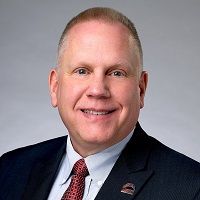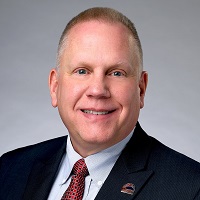Six Strategies for Retiring on a Fixed Income
When your paychecks quit rolling in, will you be OK? Run through this pre-retirement checklist to see how ready you really are for life on a fixed income.


Profit and prosper with the best of Kiplinger's advice on investing, taxes, retirement, personal finance and much more. Delivered daily. Enter your email in the box and click Sign Me Up.
You are now subscribed
Your newsletter sign-up was successful
Want to add more newsletters?

Delivered daily
Kiplinger Today
Profit and prosper with the best of Kiplinger's advice on investing, taxes, retirement, personal finance and much more delivered daily. Smart money moves start here.

Sent five days a week
Kiplinger A Step Ahead
Get practical help to make better financial decisions in your everyday life, from spending to savings on top deals.

Delivered daily
Kiplinger Closing Bell
Get today's biggest financial and investing headlines delivered to your inbox every day the U.S. stock market is open.

Sent twice a week
Kiplinger Adviser Intel
Financial pros across the country share best practices and fresh tactics to preserve and grow your wealth.

Delivered weekly
Kiplinger Tax Tips
Trim your federal and state tax bills with practical tax-planning and tax-cutting strategies.

Sent twice a week
Kiplinger Retirement Tips
Your twice-a-week guide to planning and enjoying a financially secure and richly rewarding retirement

Sent bimonthly.
Kiplinger Adviser Angle
Insights for advisers, wealth managers and other financial professionals.

Sent twice a week
Kiplinger Investing Weekly
Your twice-a-week roundup of promising stocks, funds, companies and industries you should consider, ones you should avoid, and why.

Sent weekly for six weeks
Kiplinger Invest for Retirement
Your step-by-step six-part series on how to invest for retirement, from devising a successful strategy to exactly which investments to choose.
The shift to living on a fixed income presents unique challenges and hesitations when you are approaching retirement. As CEO and president of Affinity Federal Credit Union, I've heard a wide range of concerns among our members during this transition into a new phase of life.
Fortunately, there are some effective strategies to help you manage your finances smoothly and securely.
1. Don’t retire until you can live on a budget.
One of the most significant adjustments for many people is learning to live well beneath their means. After years of steady and potentially rising incomes, the disappearance of that regular paycheck can be daunting.
From just $107.88 $24.99 for Kiplinger Personal Finance
Become a smarter, better informed investor. Subscribe from just $107.88 $24.99, plus get up to 4 Special Issues

Sign up for Kiplinger’s Free Newsletters
Profit and prosper with the best of expert advice on investing, taxes, retirement, personal finance and more - straight to your e-mail.
Profit and prosper with the best of expert advice - straight to your e-mail.
To ease this transition, I recommend adhering to a budget several years leading up to retirement to mirror what it might be like to live on a lower monthly fixed income. Living within, or ideally below, your budget helps acclimate you to the changes ahead, ensuring a smoother shift into retirement.
2. Got debt? Time to tackle it.
As you migrate to a more conservative budget, make a concerted effort to minimize or eliminate your debt — be it mortgages, car loans or credit card balances.
Using debit cards instead of credit cards can prevent the accumulation of new debts, anchoring your spending to available funds and reinforcing a disciplined financial habit. That said, odds are you will incur some debt over the course of your retirement. If you face a situation where you encounter a major expense, consult your financial professional for the best course of action to pay it off.
3. Partner up with a professional.
Your financial professional should be a trusted partner in your journey to and through retirement. It’s important to build a relationship with a financial planner or adviser well before you end your professional career. Lean on someone who understands your specific life situation and who you feel is making decisions in your best interests, assisting in your financial planning and ensuring you are on track to meet future financial and life goals.
Regular reviews of your financial plan with a professional are essential. Annual or biannual meetings can help you assess your investments’ performance and ensure you’re sticking to your budget. These reviews also offer projections for future cash flow and spending, allowing for timely adjustments.
4. Have some cash on hand (but not too much).
An emergency fund plays an indispensable role for retirees. With unexpected expenses, such as home repairs, health issues or car maintenance, having a robust savings account is more critical than ever. Ideally, this fund should be larger than it was during your working years, as recovery from large, unplanned expenses is more challenging on a fixed income.
Inflation is always a factor that significantly affects retirement planning, and for those on the brink of retirement right now, that’s especially the case. To mitigate its impact, I recommend retirees avoid holding excessive amounts of their portfolio in cash, which can erode purchasing power. A balanced investment mix, tailored to an inflationary environment, is crucial. Regularly consulting with a professional can ensure your portfolio is optimally positioned to withstand inflationary pressures.
5. Plan ahead for higher health care costs.
Rising health care costs are a prominent concern for retirees. Planning for these expenses involves understanding the full spectrum of potential costs — from Medicare to long-term care.
Budgeting for health care requires acknowledging that these costs will rise annually, consuming a larger portion of your fixed income over time. Utilizing online tools to estimate future health care costs can provide valuable guidance in this area. Review the resources available on Medicare's website and visit the website of your individual health insurer, which may also provide additional cost analysis tools.
6. Pick the right spot to retire.
Choosing where to live post-retirement is another critical decision. For some couples or individuals, it may be a very difficult one when factoring in personal relationships with family and close friends. In the end, it’s essential to ensure that you do what’s right for your overall well-being. This includes ensuring the taxes and cost of living in your chosen location can be comfortably covered by your retirement paycheck. This often-overlooked decision can significantly impact your financial comfort and stability in retirement. Take the time to consider all of the factors at play.
Wherever you settle in your golden years, personal fulfillment and well-being are paramount. Engaging in community activities, mentoring and spending quality time with family and friends are ways to enrich this life stage. Remember, retirement is not just about managing finances; it's about enjoying life to the fullest, maintaining overall well-being and finding happiness in everyday moments.
As you approach retirement, the key is to plan meticulously, adapt to new financial realities and embrace the opportunities this phase offers.
Related Content
- How Your Financial Institution Can Help You Dig Out of Debt
- To Achieve Financial Stability, Start With Small Steps
- Six of the Best Budgeting Apps
- Best Places to Retire in the U.S.
- Ready to Retire? Here Are Four Tips for the Transition
Profit and prosper with the best of Kiplinger's advice on investing, taxes, retirement, personal finance and much more. Delivered daily. Enter your email in the box and click Sign Me Up.

Kevin Brauer, a distinguished finance industry professional with over three decades of experience, has been at the helm of Affinity Credit Union as CEO and President since January 2023. His substantial contribution to Affinity over the past seven years has been instrumental in propelling the firm's value proposition and innovating its financial well-being initiatives. Brauer leads Affinity's dedicated team of 500 employees at its Basking Ridge, N.J., headquarters and throughout its 18-plus branches.
-
 The New Reality for Entertainment
The New Reality for EntertainmentThe Kiplinger Letter The entertainment industry is shifting as movie and TV companies face fierce competition, fight for attention and cope with artificial intelligence.
-
 Stocks Sink With Alphabet, Bitcoin: Stock Market Today
Stocks Sink With Alphabet, Bitcoin: Stock Market TodayA dismal round of jobs data did little to lift sentiment on Thursday.
-
 Betting on Super Bowl 2026? New IRS Tax Changes Could Cost You
Betting on Super Bowl 2026? New IRS Tax Changes Could Cost YouTaxable Income When Super Bowl LX hype fades, some fans may be surprised to learn that sports betting tax rules have shifted.
-
 The 4 Estate Planning Documents Every High-Net-Worth Family Needs (Not Just a Will)
The 4 Estate Planning Documents Every High-Net-Worth Family Needs (Not Just a Will)The key to successful estate planning for HNW families isn't just drafting these four documents, but ensuring they're current and immediately accessible.
-
 Love and Legacy: What Couples Rarely Talk About (But Should)
Love and Legacy: What Couples Rarely Talk About (But Should)Couples who talk openly about finances, including estate planning, are more likely to head into retirement joyfully. How can you get the conversation going?
-
 How to Get the Fair Value for Your Shares When You Are in the Minority Vote on a Sale of Substantially All Corporate Assets
How to Get the Fair Value for Your Shares When You Are in the Minority Vote on a Sale of Substantially All Corporate AssetsWhen a sale of substantially all corporate assets is approved by majority vote, shareholders on the losing side of the vote should understand their rights.
-
 How to Add a Pet Trust to Your Estate Plan: Don't Leave Your Best Friend to Chance
How to Add a Pet Trust to Your Estate Plan: Don't Leave Your Best Friend to ChanceAdding a pet trust to your estate plan can ensure your pets are properly looked after when you're no longer able to care for them. This is how to go about it.
-
 Want to Avoid Leaving Chaos in Your Wake? Don't Leave Behind an Outdated Estate Plan
Want to Avoid Leaving Chaos in Your Wake? Don't Leave Behind an Outdated Estate PlanAn outdated or incomplete estate plan could cause confusion for those handling your affairs at a difficult time. This guide highlights what to update and when.
-
 I'm a Financial Adviser: This Is Why I Became an Advocate for Fee-Only Financial Advice
I'm a Financial Adviser: This Is Why I Became an Advocate for Fee-Only Financial AdviceCan financial advisers who earn commissions on product sales give clients the best advice? For one professional, changing track was the clear choice.
-
 I Met With 100-Plus Advisers to Develop This Road Map for Adopting AI
I Met With 100-Plus Advisers to Develop This Road Map for Adopting AIFor financial advisers eager to embrace AI but unsure where to start, this road map will help you integrate the right tools and safeguards into your work.
-
 The Referral Revolution: How to Grow Your Business With Trust
The Referral Revolution: How to Grow Your Business With TrustYou can attract ideal clients by focusing on value and leveraging your current relationships to create a referral-based practice.